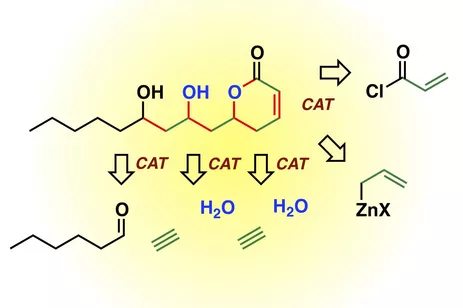Lukas Hintermann
Catalytic Methods for Organic Synthesis

Our research focus lies in the development of highly active and selective catalysts based on metal complexes or small organic molecules for sustainable organic synthesis (SOS). Such catalysts can be used both in basic molecular basic research and industrial production. Particularly, we want to develop waste-free (atom-economic) processes for achieving synthetic efficiency. In this manner, resources can be saved and application risks towards humans and the environment will be reduced.

Key publications:
Axially Chiral 1,1′-Binaphthyl-2-Carboxylic Acid (BINA-Cox) as Ligands for Titanium-Catalyzed Asymmetric Hydroalkoxylation, S. L. Helmbrecht, J. Schlüter, M. Blazejak, L. Hintermann, Eur. J. Org. Chem. 2020, 2062–2076.
Generation of Organozinc Reagents by Nickel Diazadiene Complex Catalyzed Zinc Insertion into Aryl Sulfonates, P. Klein, V. D. Lechner, T. Schimmel, L. Hintermann, Chem. Eur. J. 2020, 26, 176–180.
Discovery and Comparison of Homogeneous Catalysts in a Standardized HOT-CAT Screen with Microwave-Heating and qNMR Analysis: Exploring Catalytic Hydration of Alkynes, M. Schreyer, T. M. Milzarek, M. Wegmann, A. Brunner, L. Hintermann, ChemCatChem 2020, 12, 152–168.
Catalytic C-Alkylation of Pyrroles with Primary Alcohols: Hans Fischer's Alkali and a New Method with Iridium P,N,P-Pincer Complexes, S. Koller, M. Blazejak, L. Hintermann, Eur. J. Org. Chem. 2018, 1624–1633.
A Sequential Homologation of Alkynes and Aldehydes for Chain Elongation with Optional 13C-Labeling, A. Brunner, L. Hintermann, Chem. Eur. J. 2016, 22, 2787–2792.